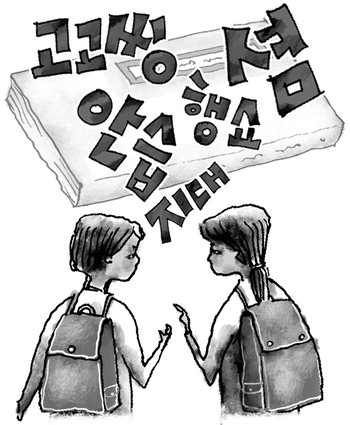
Have you ever seen the public service announcement, 'Language Purification-Talk to Me Quickly'? The short announcement on TV shows the image of teenagers who can't continue a conversation without using swear words. When the director asks teenagers to speak without slang and swear words, they stutter, beat their chest and feel frustrated. After that, flower petals float from the teenagers' lips on the screen. The petals remind students about sonorous and refined words. The announcement criticizes teenagers who lack expressiveness because of overusing slang and swear words.
Hangul Day, which celebrates the Hangul proclamation of King Sejong, is October 9th. When Hangul Day approached, many people insisted that Hangul Day should be designated as a public holiday to acknowledge the value of Hangul and let people participate in activities or performances related to Hangul. Young people were divided on this issue. Albamon, which is an online job-search site, carried out a survey about which anniversary should become a public holiday. The survey showed that 36 percent of people selected Hangul Day.
However, other people said that Koreans should limit language destruction to protect the value of Hangul rather than designate Hangul Day as a public holiday. People recently have felt bitter about language destruction caused by the notice titled '귤, 뀰, 뮬, 슐, 큘' . The notice has a picture with the words, 'The delicious tangerine is 귤, the weak tangerine is 뮬, the sour tangerine is 슐, the cool tangerine is 큘 and the green tangerine is an unripe tangerine.' It was used to advertise one fruit market. Most netizens regarded it as Hangul's greatness, but a few people considered the phenomenon as language destruction.
Is linguistic change such as abbreviations and slang positive or negative? There are a variety of opinions about this problem, so CBT reporters investigated the opinions of university students, about language destruction. In addition, we covered how many people use abbreviations and slang and asked opinions about it from foreigners.
How often do you use acronyms and slang?
Jeon Ju-young (Korea) : I don't often use acronyms or slang. When I was in middle school and high school, I used acronyms and slang which were popular at the time. However, I have been reducing their usage because I seldom heard them after I became a university student, but I usually use acronyms and slang that I already know when I meet close friends and communicate with them.
Si Woo-cheol (China) : I frequently use acronyms and slang. It is comfortable when I normally speak in the real world and communicate through the Internet. I consider convenience as the most important thing when I speak and write. However, I control using them when I make important reports and talk to parents.
Kelly Lewis (U.S.A) : I use it all the time, like omg(oh, my god), lol(laughing out loud) and smh(shake my head). I use it with our generation because it'd be weird to see older people using it.
What do you think about using acronyms and slang?
Jeon Ju-young (Korea) : I think that the reason why people use acronyms and slang is that acronyms are more comfortable than using other words when they speak or write, and they frequently see people using them. However, I think the acronyms are not good because people can truncate the words, and other people don't understand those words' meanings.
Si Woo-cheol (China) : Chinese people prefer using acronyms and slang because the Chinese language is difficult to write. As the Internet develops, the use of acronyms is rapidly increasing in China. I think that this change is a positive thing because communication is difficult as the Chinese language has too many letters.
Kelly Lewis (U.S.A) : I don't mind it! I believe using acronyms at the right time can save time. However, it's just that a lot of the newly created acronyms are not necessary most of the time, and I think by not being able to fully spell out the words and by saying out the acronyms that the kids are missing out on the flow of language.


 All
All Experience
Experience






 고아진
고아진











